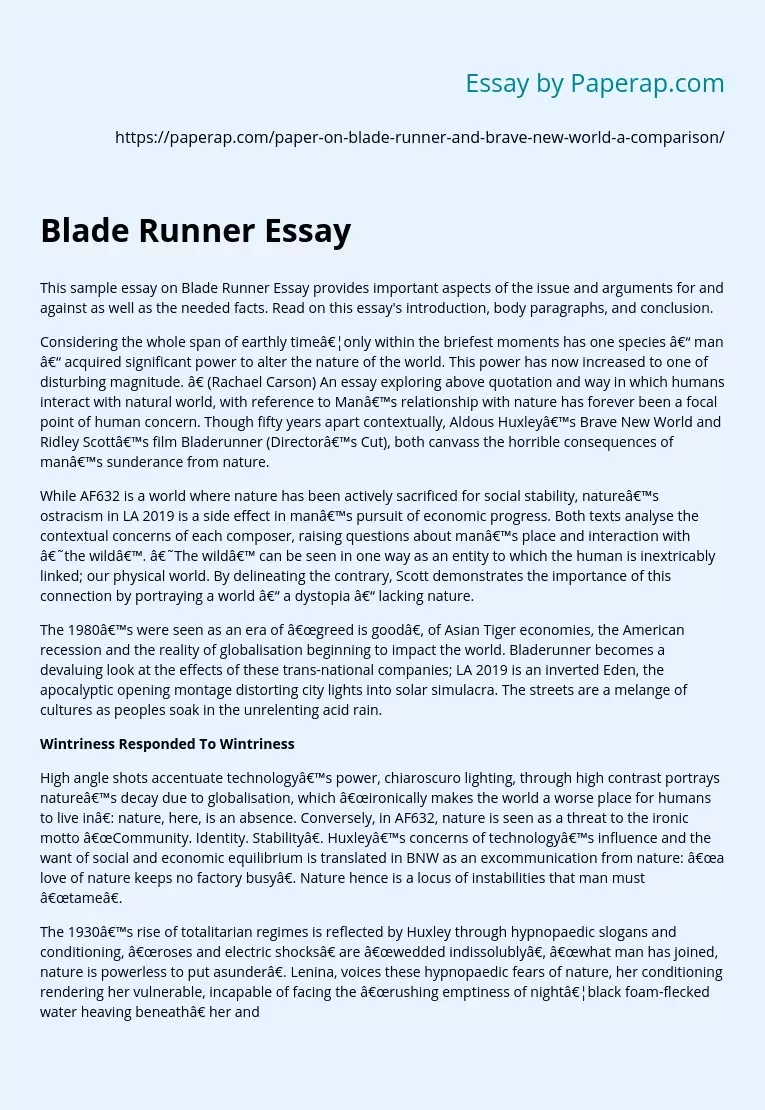Blade Runner Essay
This sample essay on Blade Runner Essay provides important aspects of the issue and arguments for and against as well as the needed facts. Read on this essay’s introduction, body paragraphs, and conclusion.
Considering the whole span of earthly time…only within the briefest moments has one species – man – acquired significant power to alter the nature of the world. This power has now increased to one of disturbing magnitude. ” (Rachael Carson) An essay exploring above quotation and way in which humans interact with natural world, with reference to Man’s relationship with nature has forever been a focal point of human concern.
Though fifty years apart contextually, Aldous Huxley’s Brave New World and Ridley Scott’s film Bladerunner (Director’s Cut), both canvass the horrible consequences of man’s sunderance from nature.
While AF632 is a world where nature has been actively sacrificed for social stability, nature’s ostracism in LA 2019 is a side effect in man’s pursuit of economic progress.
Both texts analyse the contextual concerns of each composer, raising questions about man’s place and interaction with ‘the wild’. ‘The wild’ can be seen in one way as an entity to which the human is inextricably linked; our physical world. By delineating the contrary, Scott demonstrates the importance of this connection by portraying a world – a dystopia – lacking nature.
The 1980’s were seen as an era of “greed is good”, of Asian Tiger economies, the American recession and the reality of globalisation beginning to impact the world.
Bladerunner becomes a devaluing look at the effects of these trans-national companies; LA 2019 is an inverted Eden, the apocalyptic opening montage distorting city lights into solar simulacra. The streets are a melange of cultures as peoples soak in the unrelenting acid rain.
Wintriness Responded To Wintriness
High angle shots accentuate technology’s power, chiaroscuro lighting, through high contrast portrays nature’s decay due to globalisation, which “ironically makes the world a worse place for humans to live in”: nature, here, is an absence. Conversely, in AF632, nature is seen as a threat to the ironic motto “Community. Identity. Stability”. Huxley’s concerns of technology’s influence and the want of social and economic equilibrium is translated in BNW as an excommunication from nature: “a love of nature keeps no factory busy”. Nature hence is a locus of instabilities that man must “tame”.
The 1930’s rise of totalitarian regimes is reflected by Huxley through hypnopaedic slogans and conditioning, “roses and electric shocks” are “wedded indissolubly”, “what man has joined, nature is powerless to put asunder”. Lenina, voices these hypnopaedic fears of nature, her conditioning rendering her vulnerable, incapable of facing the “rushing emptiness of night…black foam-flecked water heaving beneath” her and Bernard. The natural world invites a questioning of the self, as Bernard says, “It makes me feel as though…I were more me” thus posing a threat to social stability.
What is also intrinsic to the human condition is instinct and emotion, not solely the “nature of the world,” and the disturbing magnitude of man’s power does not extend to this. In BNW the very use of pregnancy substitutes and violent passion surrogates is indicative of natural instincts that cannot be sated even through conditioning. The characterisation of Batty and Pris in BR and John and Linda in BRW stand testament to these instincts. Linda, though disgusted motherhood, is resilient to her hypnopaedic teachings through her raising of John.
Batty and Pris’ carnal lust for each other, emphasised by the animal imagery of Pris’ make-up, similarly portrays an intrinsic state of the ‘wild’ in man. The replicants are “more human than human” and it is ironic that we see these raw passions in them, rather than in the “human” characters. Batty’s wolf howls and extreme close-ups of his blood stained face allude to images of the primitive. According to the postmodern theorist Baudrillard, “it is the generation by models of a real without origin…a hyperreal. Bladerunner, a postmodern text in its eclectic amalgam of dystopic, film noir, crime and speculative genres, thus embodies Baudrillard’s view that there is no reality behind an image. The World State’s masking of emotion with surrogates furthers this, where artificial feelings replace that which was once real, revealing the need to replace the natural with a surrogate. Huxley and Scott both shape ideas of a ‘wilderness’ through their dystopic representations, a result of our aim to “alter” nature and its processes.
The World State is a moral ‘wilderness’. Huxley employs parodies of religion to satirise the Solidarity Services, “orgy porgy” and soma, “Christianity without the tears”, revealing a contextual concern with the hedonism of a post-war world. Ford is god, a cruel parody of a society orientated towards mass production and consumption, where “spending is better than mending”. The incongruity of a society with “infantile and embryonic fixations” invokes humour, a tool that Huxley employs to actively deride and condemn our divorce from nature.
The motif of replicate and Gaff’s origami animals are used by Scott to show a ‘wilderness’ lacking reality, but obviously longing for it; nature is commoditised, as Zhora says “think I’d be working in a place like this if I had a real snake? ” The Tyrell building itself is hollow despite the grandeur portrayed by low angle shots and the soaring Vangelis score. The Aztec form is a homage to consumerism, to a god that “manifests himself as an absence”. Natural process such as birth are usurped.
Birth is measured in meters, the London Hatchery is a sterile womb, “harsh…bleak…wintriness responded to wintriness” stands in counterpoint to the Reservation, “pulsing with the indefatigable movement of blood”. The replicants have truncated life spans, life and death in both texts are regulated, thus presenting a world where natural rhythms are distorted. Batty, like John, claim a right to a life lived in ‘the wild’: “I’m claiming the right to be unhappy…to grow old…to be tortured by unspeakable pains of every kind”, but ultimately succumb to these ‘wildernesses’, “all these moments will be lost in time like tears in rain”.
As technology advances, so does the destruction of the natural world – we subdue ‘the wild’, and in turn, man’s right to be free. In the miasma of LA 2019, Deckard is isolated, compartmentalised, despite the masses on the street, the high angle shots further reduce the individuals scale to the world. The “human maggots” of AF632 stand as a body festering around Linda and John. In both cases, the composers portray the individual as subaltern and thus raise the concern of the loss of individuality to progress and globalisation: “when the individual feels, the community reels”.
Blade Runner Essay. (2019, Dec 06). Retrieved from https://paperap.com/paper-on-blade-runner-and-brave-new-world-a-comparison/

